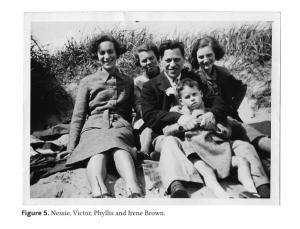My family, ubuntu and social work…

Published by Professional Social Work magazine, 2 March, 2021
I was actually excited by a piece of data recently. The Edinburgh University published index cards of former students to celebrate the centenary of its social work department. Among them was Asnah Brown, who I knew as Nessie, my great aunt, a social work student at the university between 1946 and 1949.
I stayed with Nessie and my great uncle Victor in school holidays after my father died in 1966 when I was 13. I was living in London and suspect I’m not the only one to rely on this kind of non-officially organised kinship support in difficult family circumstances.
I didn’t know Nessie was a social worker then but I remember Jewish academics visiting her and Victor for afternoon tea on Sunday afternoons. In particular, I remember a discussion on the nature of the mind which interested me - it's probably what led me to do a psychology degree five years later.
Victor took the Morning Star newspaper every day. Although he wasn’t a Communist Party member, he had run a furniture shop in the then Mining Community of Methil, Fife. This too had an influence on me, perhaps leading me to become a Labour councillor in the 80s and 90s.
After Nessie and Victor passed away, a Kindertransport survivor named Gerhard Hirsch contacted my sister. He told her that him and his sister had stayed with Nessie and Victor during the Second World War. They had fled persecution travelling by train from Berlin to Rotterdam, then by sea to Southampton.
Somehow their mother survived the war, managing to get out of Germany on a boat to Cuba, and from there to New York, evading a US blockade of refugees. The Hirsch children were only able to join their mother after the war.
Gerhard, who changed his name to Gary, died two years ago aged 87 in America where he ended up living. The reason he had got in touch with my sister was because he had been moved by news reports about the plight of Syrian refugees in Europe and had wanted to help.
I reflected on how Kindertransport hosts had helped him and others live such a long life. Along with the support I received when I was young, it resonates with the theme of World Social Work Day on 16 March ubunto – I am because, we are – recognition of our inter-connectedness and that we must all look after each other.
That message is also reinforced for me each year on Holocaust Memorial Day in January when I remember members of my family who perished in the Nazi death camps of Treblinka and Auschwitz.
There were other members of my extended family across the UK that supported me during my early years, many of whom had an influence on me. My Yorkshire uncle, for example, was a member of Yorkshire County Cricket Club and took me to a match which led to a lifetime love of this sport.
I stayed with another aunt and uncle at a flat in Chelsea at the height of 1960s counter-culture and would also often spend weekends with my Almoner aunt and cousins.
I was lucky in the kinship support I received after my father died. I know many others haven’t been so favoured.
Nessie and Victor remain role models to me. They also played a part in my first social care job in a residential home for children with learning disabilities in the 1970s. At that time the general view was children with learning disabilities should be locked away.
I remember talking to Nessie about this, which was when she told me her and Victor had a child called George who had Down's Syndrome. He passed away before I even knew about him. She talked about how they had been forced to send George to a large establishment many miles away and the campaigning she did to make sure there were public transport links to it, which initially did not exist.
As a social worker I was always optimistic that there could be good outcomes for children if they were given the right support at the right time with the right resources. I have little time for those who think 13 is too late to have influence on a child.
The old proverb that it takes a whole village to raise a child resonates true. Like ubunto, it is ancient African wisdom that has much to teach the world about our common humanity, if only we take heed of it.
Richard Servian is a BASW member
